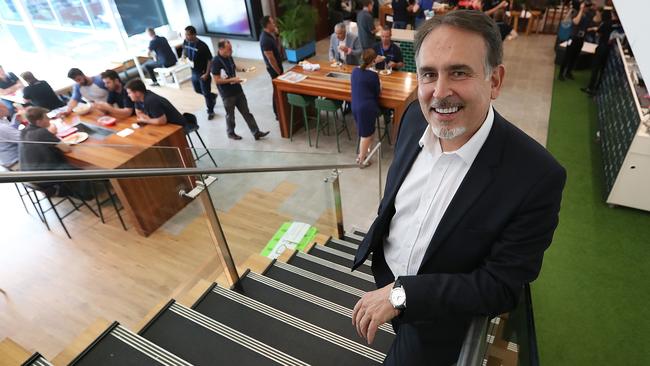TechnologyOne founder Adrian Di Marco wants to rein in power of proxy advisers
Outspoken technology entrepreneur Adrian Di Marco has renewed his withering attack on the nation’s proxy advisers saying company boards are afraid of crossing them.

Business
Don't miss out on the headlines from Business. Followed categories will be added to My News.
Outspoken technology entrepreneur Adrian Di Marco has renewed his withering attack on the nation’s proxy advisers, accusing them of ushering in an atmosphere of fear and censorship among public companies with boards too fearful to cross them.
The founder and executive chair of ASX-listed TechnologyOne, who himself has faced the wrath of proxy advisers including a first strike against his remuneration report this year, has accused proxy advisers of having too much power by attempting to impose their own views on boards and presiding over a “fundamentally broken system”.
He said this was placing many boards and managements in “straitjackets” while the institutional investors that hold large parcels of stock in public companies were not meeting their fiduciary obligations to investors as they blindly followed the voting recommendations of powerful proxy firms. He called their blind adherence to proxy advice as “robo voting”.
Mr Di Marco has welcomed Treasurer Josh Frydenberg’s recent regulations placed on proxy advisers but called on the government to go further when addressing the power imbalance between proxy advisers and companies. He said proxy advisers often didn’t understand industry dynamics and were helping to destroy shareholder wealth.
“Proxy advisers have huge influence and have built lucrative business around that,” Mr Di Marco said.
“It should be up to shareholders to make the decisions, it should be the majority of shareholders, and institutions have to be stopped robo voting, that what the Treasurer is trying to do, but he hasn’t gone far enough.
“They (proxy advisers) need to publish why they have made decisions and institutions need to show where they have looked at issues – and in light of shareholder value, not just following what the advisers have said. Directors are slowly getting pushed into this straight jacket of doing what the proxy advisers want.”
There is a lot at stake. The nation’s super funds control more than $3 trillion in investor funds while institutional investors sit on similarly large sums of money invested in public companies and they are increasingly taking advice from proxy advisers on how to vote at AGMs.
Before Christmas Mr Frydenberg acted to tighten regulations on the sector with proposed changes including a requirement that advisers providing proxy advice will need to hold an Australian Financial Service Licence.
Proxy advisers will also be required to share their advice with a company on the same day their advice is provided to institutional clients.
The new regulations, set to come into force early next year, were criticised by some in the investment community, including proxy advisers, for a lack of consultation and threatening the viability of an industry which is helping to encourage public companies to adhere to corporate governance principles.
Mr Di Marco has called for the threshold for strikes against remuneration reports at AGMs to be lifted to 50 per cent from 25 per cent.
He said there were “many misleading statements” being made by proxy advisers.
“Everyone knows it is fundamentally a broken system because they (proxy advisers) have far too much influence on public companies, pushing them to adopt a one size fits all straitjacket approach and with no scientific evidence to back what they are doing.
“Research both here and overseas actually shows it leads to the destruction of shareholder value.”
Mr Di Marco said he had first hand experience as he and members of his executive team spent hours with a proxy adviser trying to explain an aspect of TechnologyOne’s latest remuneration report but walked away from the meetings believing them to be a waste of time.
“As chairman I have had a number of dealings with one proxy adviser in particular over minuscule issues and they are threatening a strike against the remuneration report over this. It has involved myself, my CFO, directors and we have had to point out their mistakes, this is draining a company of four or five of its most senior people who are dealing with this one proxy adviser.
“The person we are dealing with doesn’t understand our industry or our business nor does he care to understand.
“He looks at us once a year for a couple of days and tries to understand a complex remuneration report … and we are in the room just rolling our eyes and thinking you have got to be joking, the waste of intellectual capacity, it is truly a waste of time and effort. It is not just us, it is across boards, across the country.”
More Coverage
Originally published as TechnologyOne founder Adrian Di Marco wants to rein in power of proxy advisers





